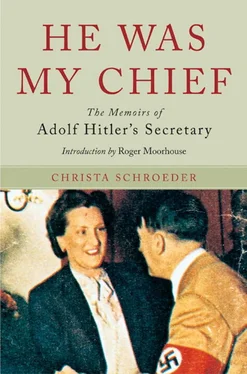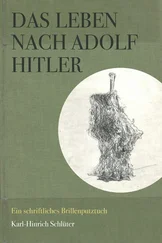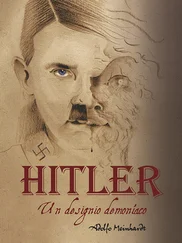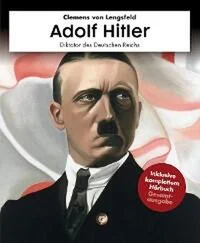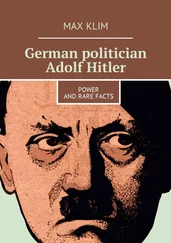Christa Schroeder - He Was My Chief - The Memoirs of Adolf Hitler's Secretary
Здесь есть возможность читать онлайн «Christa Schroeder - He Was My Chief - The Memoirs of Adolf Hitler's Secretary» весь текст электронной книги совершенно бесплатно (целиком полную версию без сокращений). В некоторых случаях можно слушать аудио, скачать через торрент в формате fb2 и присутствует краткое содержание. Город: Barnsley, Год выпуска: 2012, ISBN: 2012, Издательство: Frontline Books, Жанр: История, Биографии и Мемуары, на английском языке. Описание произведения, (предисловие) а так же отзывы посетителей доступны на портале библиотеки ЛибКат.
- Название:He Was My Chief: The Memoirs of Adolf Hitler's Secretary
- Автор:
- Издательство:Frontline Books
- Жанр:
- Год:2012
- Город:Barnsley
- ISBN:978-1-7830-3064-4
- Рейтинг книги:4 / 5. Голосов: 1
-
Избранное:Добавить в избранное
- Отзывы:
-
Ваша оценка:
- 80
- 1
- 2
- 3
- 4
- 5
He Was My Chief: The Memoirs of Adolf Hitler's Secretary: краткое содержание, описание и аннотация
Предлагаем к чтению аннотацию, описание, краткое содержание или предисловие (зависит от того, что написал сам автор книги «He Was My Chief: The Memoirs of Adolf Hitler's Secretary»). Если вы не нашли необходимую информацию о книге — напишите в комментариях, мы постараемся отыскать её.
He Was My Chief: The Memoirs of Adolf Hitler's Secretary — читать онлайн бесплатно полную книгу (весь текст) целиком
Ниже представлен текст книги, разбитый по страницам. Система сохранения места последней прочитанной страницы, позволяет с удобством читать онлайн бесплатно книгу «He Was My Chief: The Memoirs of Adolf Hitler's Secretary», без необходимости каждый раз заново искать на чём Вы остановились. Поставьте закладку, и сможете в любой момент перейти на страницу, на которой закончили чтение.
Интервал:
Закладка:
The guests would descend five steps from the living room into the Great Hall, of which Hitler was particularly fond. It had a high ceiling and a floor area of almost 200 square metres. The floor was laid with a strawberr y-coloured pile carpet. Three marble steps led to the armchairs around the fireplace. There was little other furniture there. Two large cabinets, some chairs near the great window, a large conference table, a globe, a grandfather clock; then a piano and some small commodes. One of the large cabinets had handles carved in the shape of human heads. Certificates of citizenship and old weapons were displayed in it. In the other were old artefacts in tin behind a glass front. Magnificent Gobelin tapestries depicting hunting scenes covered apertures in the walls necessary for the film shows.
The large old masters in the Hall were changed regularly. Very often Nana by Anselm Feuerbach (Feuerbach’s long-term lover from Rome, the wife of a cobbler), a particular favourite of Hitler, hung near the fireplace. On the long wall of the Hall was a wonderful likeness of a woman dressed in red by Bordone, red carnations in the same shade of deep red always stood on a commode nearby. The most impressive thing in the Great Hall, which had a dark brown ceiling, was undoubtedly the magnificent window, nine metres wide. It could be sunk down to show the majestic panorama of the Untersberg mountain as if in a frame. [121] This large window was subdivided into ninety individual windows. Hitler, who was very proud of it, once remarked to his adjutant Wiedemann: ‘Really, I built a house around a window here.’
The mammoth rectangular table standing in front of the window had a top of Untersberg marble and proved very useful at conferences for spreading out large maps on its surface.
Amongst the seating about the marble fireplace, a gift from Mussolini, was a black leather sofa. It was of gigantic proportions, and in relation to the size of the Hall it looked good, but was extremely uncomfortable. The square footage available for sitting on was so enormous that it was not possible to sit and lean against the back rest. At the beginning of the fireplace session one would have to sit bolt upright on the edge of the sofa, but as the evening wore on the ladies would find it more comfortable to lean against the sofa back with their legs tucked under them. The sets consisting of upholstered chairs each with a small table and suitable for small groups of guests were much more acceptable.
The fire was not lit every evening. Hitler’s place was on the right side of it between two ladies (Eva Braun always at his right). He would say when it should be lit. He usually started the conversation or would intervene once a particular topic caught his interest. If he did not feel like talking, and there were evenings which palled into awkward silences, he would often burst the tension with: ‘Should we listen to some music for a while?’ and all would agree with enthusiasm. The music cabinet was controlled by Martin Bormann and was located at the side of the window. From the long repertoire he had drawn up the greatest favourites were the symphonies by Bruckner and Beethoven, the songs of Richard Strauss, Hugo Wolf, Brahms, Beethoven, Schubert and Schumann, and the last act from Aida .
Hitler was very partial to Richard Wagner’s works of course. In first place for him was Tristan and Isolde , a work of which he once said that he would like to listen to it in the hour of his death. Hitler considered Wagner to be ‘the man who re-awoke German culture from the spirit of music’. Wagner’s musical language was to Hitler’s ears ‘like a divine manifestation’. He had seen some of Wagner’s operas very frequently and nothing in the world would induce him to miss the annual Bayreuth Festival (not even the Spanish Civil War in 1936). He sponsored Bayreuth financially, and was planning to make visits to the Festival available to all sections of German society, a national pilgrimage, so to speak. The Deutsche Arbeitsfront , the official organisation for German workers, arranged trips to Bayreuth for workers and employees to develop enthusiasm for Wagner’s works throughout all strata of society.
Hitler also enjoyed light classical music such as The Merry Widow, Die Fledermaus and Zigeunerbaron . A number of the male guests preferred to retire to the lounge on evenings when music was to the forefront. The frequent confrontations between Heinrich Hoffmann and Julius Schaub seemed to be provoked by music. If the argument became too loud, Hitler would send a manservant to the lounge with the request either that they should reduce the volume or return to the fireplace. These occurrences would often remind Hitler of awkward situations which tended to develop at musical presentations when his escort did not like listening to music. ‘Whenever I visit the opera I have to take care that my officers do not snore. One day during Tristan and Isolde , Heinrich Hoffmann nearly fell over the ledge out of the box. I had to wake Schaub up to tell him to give Hoffmann a shake. Brückner was behind me snoring. It was dreadful!’
Hitler was very good at telling anecdotes like these and everybody enjoyed listening to them, even Eva Braun. If conversations were mentioned of which she disapproved this would be immediately evident and then even Hitler would notice. He would stroke her hand resting on the arm of her chair, whisper a few words and then she would disappear upstairs. This would also happen if she thought that Hitler was paying too much attention to another woman. [122] In her stenographic notes, Schroeder stated: ‘If any woman was present in whom Eva feared a competitor, then she either retired very soon to her room or became so unpleasant that Hitler would notice and persuade her to withdraw “because she was tired”.’
At New Year 1938 Gretl Slezak gave me a letter to hand to Hitler privately without anybody seeing. As he was about to leave the Hall I detained him. Once all the guests had gone below to the bowling alley in the basement for drinks, he took my arm and strolled up and down with me in the Great Hall. My evening dress of roe deer-brown fluffy material with a small train, added to which my silver-fox fur cape must have looked magnificent, supported by a small tipsiness which I had got from the dinner, lent me a large slice of self-confidence and courage, for after I had handed him the letter I broke into hymns of praise about Gretl Slezak, which must have seemed close to an attempt at matchmaking. Convinced that he must share my opinion, I finished with: ‘Eva is nothing for you, mein Führer !’
Instead of annoyance at this impertinent remark, Hitler looked at me in amusement and replied: ‘But she is enough for me!’ Enough? Where was ‘the great love’ of which so many writers have been in the know since 1945? Clearly, my attempt at matchmaking that New Year’s Eve amused Hitler no end, for he made no move to leave the Hall. We had been alone together for rather too long, it seemed, for Eva Braun appeared suddenly, gave me a scowl and said in hurt tones to Hitler: ‘Where have you been, we are all waiting for you!’
Hitler did not forget this episode, for a few weeks later he brought it up and said to me with a smile, ‘That night you had a certain something’. That night the New Year’s Eve photo was taken in the Great Hall before the fireplace. It was the last New Year’s celebration at which so many guests would be present.
Another unforgettable experience in the Great Hall was Hitler’s dictation of 11 May 1941. Despite innumerable attempts, a plausible explanation for the flight of his deputy Rudolf Hess to Britain eluded him. He tried out all the possible motives he could think of and tried to encapsulate them in words, but nothing seemed to fit properly. Only when he viewed the flight as the act of a madman did he seem satisfied. I had never known a dictation cause him so much trouble as this one. [123] On the question whether Hess flew to Britain with Hitler’s knowledge or on his own initiative: one of Martin Bormann’s secretaries wrote in a letter to Schroeder: ‘I am of the opinion that Adolf Hitler knew nothing of the flight. Martin Bormann told me at the time… Martin Bormann was always straight! It is unlikely that Hitler would have been so stupid as to send Hess to negotiate with a man neither knew and who was a friend of Churchill.’ Hans Baur, Hitler’s personal pilot, said: ‘I overheard a conversation in the Reich Chancellery garden between Hitler and Göring: Hitler did not realise I was nearby when he screamed at Göring: “He has simply gone mad, he must know that by doing that he has stabbed me in the back!”’
Интервал:
Закладка:
Похожие книги на «He Was My Chief: The Memoirs of Adolf Hitler's Secretary»
Представляем Вашему вниманию похожие книги на «He Was My Chief: The Memoirs of Adolf Hitler's Secretary» списком для выбора. Мы отобрали схожую по названию и смыслу литературу в надежде предоставить читателям больше вариантов отыскать новые, интересные, ещё непрочитанные произведения.
Обсуждение, отзывы о книге «He Was My Chief: The Memoirs of Adolf Hitler's Secretary» и просто собственные мнения читателей. Оставьте ваши комментарии, напишите, что Вы думаете о произведении, его смысле или главных героях. Укажите что конкретно понравилось, а что нет, и почему Вы так считаете.
